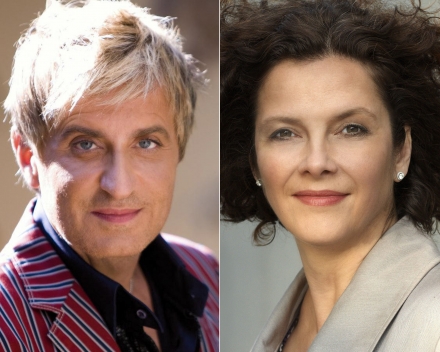Kirchschlager, Thibaudet captivate with music of Brahms and Liszt

Mezzo-soprano Angelika Kirchschlager and pianist Jean-Yves Thibaudet performed a program of Brahms and Liszt Friday night at Jordan Hall.
Angelika Kirchschlager and Jean-Yves Thibaudet may have wondered whether they really qualify as classical celebrities when they walked onstage Friday night for their recital of music by Brahms and Liszt, presented by the Celebrity Series of Boston. The intimate space of the New England Conservatory’s Jordan Hall was only half full of ticketholders to hear the renowned Austrian mezzo-soprano and the French pianist. By contrast, the previous event in this series, two weeks ago, featured the pianist Lang Lang on a rock-star cloud, with T-shirt vendors and hordes of fans crowding into Symphony Hall.
However, the enthusiastic applause that followed this short and sweet program of songs and piano pieces seemed to tell the artists that one can be as big a celebrity with two hundred people present as with three thousand.
Celebrity comes from bonding with the audience, and Kirchschlager accomplished that with a winning, slightly girlish onstage personality, pleasantly contrasted with her collaborator’s sangfroid. Early in the program, she asked listeners to hold their applause till the end of a group of songs, but later, after an especially affecting rendering of Liszt’s O lieb, so lang du lieben kannst (known to piano fans as Liebestraum No. 3), the audience couldn’t restrain itself, and Kirchschlager just shrugged, smiled, and basked in it.
The evening’s informal tone was established with the first song group, a selection from Brahms’s Deutsche Volkslieder. These folk songs, very gently enhanced by artful piano accompaniment, cover a wide range of moods and remind us of the musical roots of the great strophic songs of Schubert and others. For these, Kirchschlager put aside her “big” voice, sketching the melancholy of Da unten im Tale and the saucy dialogue of Feinsliebschen, du sollst with a speech-like delivery.
The eight original Brahms songs in the second group gave singer and pianist more scope of expression. Kirchschlager revealed a voice that, while a little on the reedy side, is capable of many mood colors, and textures from whispery to quasi-operatic. The dramatic, anthem-like Von ewiger Liebe has been sung more grandly before, but rarely with as much emotional nuance as here. With the piano lid wide open, Thibaud delivered Brahms’s famously thick song accompaniments in a cool, dry style that sometimes left one wishing he’d engaged the singer a little more.
In this bicentennial year for Liszt, many of his less-known works are on exhibit, including the songs. Few would rank Liszt near the top of song composers, but the selections on this program showed a fine sense of color and drama. As might be expected from this über-virtuoso, the piano figured prominently in them, whether as a watery ripple in Im Rhein, im Schönen Strome or as brilliant echoes of the Hungarian Rhapsodies in Die drei Zigeguner. Here, Thibaudet stepped up to the music with Lisztian fire and wit to match his partner’s vivid expressiveness.
Thibaudet also offered two lyrical piano pieces, Brahms’s Intermezzo in A major, Op. 118, No. 2, and Liszt’s Consolation No. 3, as solo interludes. Thibaudet’s renderings of these two favorites, while finely nuanced, sounded rather cool and veiled.
The concert closed with two encores, Liszt’s elusive Es muss ein Wunderbares sein and another Brahms folk-song arrangement, a lullaby that Kirchschlager told the audience her mother sang to her as a child.
Posted in Performances





Posted Nov 15, 2011 at 9:32 am by James J. Lewis
What an excellent review! I, too, was disappointed at the poor attendance, but shared in the enthusitastic applause after each group of lieder. Having lived in Germany for many years and knowing the language well, Kirchschlager’s diction was a joy. You describe her vocal skills to a tee, so I don’t need to say anything about them.
Thibaudet, following in the great tradition of Gerald Moore, accompanied the mezzo to perfection. (It is rare that a soloist of his ilk can take on the roll of an accompanist so well!) His relaxed and unassuming air at the steinway made him even more endearing.
Jordan Hall is a gorgeous venue for such a recital with its architectural beauty and perfect acoustics.
All in all, this was a Liederabend that was eminently worth experiencing; I feel sorry for all who could have filled the empty seats.